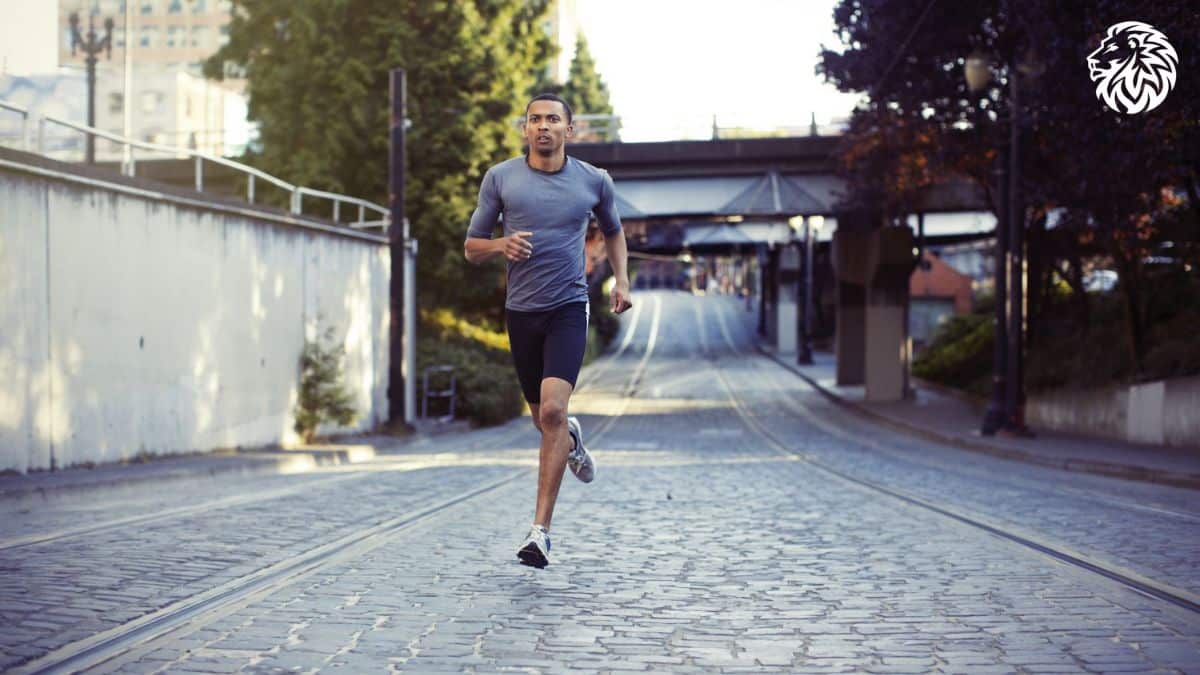Importance of Proper Form
Impact on Running Economy
Getting your running form right is a bit like finding that perfect pancake flip—oh so satisfying and keeps things moving smooth! It’s all about how your body uses energy at your cruising speed. When you nail this, you’re like a well-oiled machine: less effort, more bang for your buck, and maybe a few more “Hey, you’re pretty fast!” from the folks on the trail.
Science agrees. A couple of tweaks to how you move can seriously up the efficiency game (Peloton). Things like bending your knee more when your foot first kisses the ground, not bending it too much during your stride, and picking up your step rate can make a real difference (NCBI).
Just check out how stepping it up could shake up your energy use:
| Step Rate Increase | % Improvement in Running Economy |
|---|---|
| 5% | 4.0% |
| 10% | 6.2% |
Performance Benefits
Getting your running form to play nice doesn’t just put you in the running economy hall of fame—it’s like unlocking a whole cheat code of performance boosts. With a snazzy form, you can call on your muscles like superheroes ready to save the day, which makes you both quicker and sturdier. Plus, doing practice drills gets this form etched into your muscle memory so it sticks, even when you feel like you’re running on empty (Training Peaks).
Here’s what having your form game strong can score you:
- Increased Speed: Like taking the express lane without paying tolls, you’ll zip by using either the same or less energy.
- Enhanced Endurance: You’ll keep going past where you normally might’ve hit the wall.
- Reduced Injury Risk: With the right form, it’s like giving your joints and muscles a big ol’ group hug, warding off those pesky running aches.
Want to dodge injuries? Peek at our guide on common running injuries.
Runners who treat their form with care are often staving off injuries, maintaining efficiency, and generally outrunning those who don’t bother (Training Peaks). If you’re itching for ways to step it up and stay on the safe side, check these out:
Get your form spot-on to power up your run and hit those fitness targets like a pro. Keep it steady, strong, and comfy.
Key Elements of Proper Form
Nail your running routine by refining your form, which is a big deal not just for getting faster, but for keeping injuries at bay. Check out these three major tips to up your running game.
Arm Swing Technique
Believe it or not, swinging your arms right is a cornerstone of steady, balanced running. Keep your arms cruising between your hips and chest. This way, you’re not only saving energy but also cutting down on unnecessary body movements.
Arm Swing Guidelines
- Move from the shoulders, not the elbows
- Keep elbows bent at about 90 degrees
- Let your hands glide close from your chest to your sides
Maintaining Neutral Pelvis
Keeping your pelvis chill and in line is a real game-changer for running. It’s all about keeping things straight and steady to stop the bounce. This keeps your run smooth and energy-efficient.
Steps to Keep a Neutral Pelvis
- Tighten up those core muscles
- Lean slightly forward from your ankles, not your waist
- Picture your hips being pulled up by a string at your belly button
Foot Strike Position
Where your foot lands in relation to your body decides a lot about your run’s efficiency. Aim to kiss the ground with your feet right under your hips, minimizing those braking forces and keeping things smooth.
| Foot Strike | What It Looks Like | Perks |
|---|---|---|
| Heel | Hitting the heel first | Common in newbies, might lead to over-striding |
| Midfoot | Landing on the ball of your foot | Balanced and less impact |
| Forefoot | Foot hits on the front | Sprint-friendly, needs strong calves |
If you’re up for more running wisdom, check out our page on running techniques.
To better your running form, mix in some core exercises, practice landing your feet right, and watch yourself run stronger and safer. Get more nuggets of advice from our sections on running warm-up exercises, running shoes reviews, and common running injuries. Keep up the good pace!
Foot Strike Variations
When you run, the initial part of your foot that says “hello” to the ground is known as your foot strike. Knowing the types of foot strikes can give you an extra edge in your running game. We’re gonna chat about three common styles: heel striking, midfoot striking, and forefoot striking.
Heel Striking
Heel striking is when your heel says howdy first. Loads of folks run this way, but it does come with a catch. Like Uncle Bob trying to stop a runaway shopping cart, heel strikers tend to overstride, leading to more force and impact (Kinetic Revolution). It’s like you’re slamming the brakes every time you land, which can put a load of stress on your legs and make ’em holler. If you’re new to the running world, consider checking out running tips for beginners to keep those mishaps at bay.
Midfoot Striking
Midfoot striking is like your foot having an all-parts-invited party with the ground. It’s popular with long-distance champs because it’s smooth like butter. Landing this way cuts down on that braking force and feels pretty easy on the ol’ joints, keeping overuse injuries at bay (Kinetic Revolution). Legends like Eliud Kipchoge show this style some love. If you’re eager to give midfoot striking a whirl, some running warm-up exercises might just be your new best buddy.
| Foot Strike Style | Touchdown Spot | What It’s Like | Heads Up |
|---|---|---|---|
| Heel Striking | Heel | User-friendly for beginners | Can feel like hitting the brakes hard |
| Midfoot Striking | Midfoot | Slick for long hauls, reduces shock | Overstriding can cramp your style |
| Forefoot Striking | Balls of Feet | Speedy and bouncy | Work those calves and Achilles hard |
Forefoot Striking
Landing on your toes—forefoot striking—gives you a slight pep in your step. Sprinters dig this style because it’s lightning-fast and feels featherweight. But if you’re clocking in long distances, watch out! It can seriously work those calf muscles and Achilles, making them scream for mercy (Kinetic Revolution). Should you go down this path, make sure to give your lower legs some love. Add a touch of running and yoga into your routine to boost your strength and flexibility.
Grasping these foot strike styles can really help in picking the one that’s a perfect fit for your runs. For more wisdom on catching that runner’s high, pop over to our piece about the benefits of running. Start perfecting that proper running form today, and keep those feet moving!
Injury Prevention through Form
Picking up the knack for running right is a game-changer when it comes to dodging injuries and boosting your run mojo. We’ll chat about two biggies that help keep you on the safe side of running: dodging stress fractures and steering clear of over-striding.
Reducing Stress Fractures
Think of stress fractures as tiny bone cracks that come about when you’re pushing yourself too hard or too often. You can tip the odds in your favor by keeping your run style sharp; aim to land your feet close to your body’s center when you hit the ground. This smooth move can cut down the fracture risks by a neat 3-6% (RunRepeat).
Also, dialing down your leg stretch as you push off can work wonders for your energy use while pounding the pavement. In turn, your bones and ligaments will thank you for going easy on them.
Here’s a cheat sheet showing how landing technique tweaks help cut down fracture chances:
| Landing Technique | Stress Fracture Risk Reduction |
|---|---|
| Landing Close to Center of Mass | 3-6% |
Want to get the scoop on handling running injuries? Check out our guide on common running injuries.
Avoiding Over-Striding
Over-striding is when your foot’s getting too ambitious and lands way in front of you. This can throw a wrench in your run efficiency and bump up injury risk. Tweaking how often and how far you step can set you on the right path. Studies reveal upping your step rate trims down the bobbing of your body and cuts the punch from hitting the ground (NCBI).
Stepping more often also means your joints—hip, knee, ankle—don’t have to suck up as much energy, dodging wear and tear. By cranking up your step rate, you bring your landing zone closer to home, cutting out over-striding.
Here’s a quick glance at stepping up your step game:
| Benefit | Explanation |
|---|---|
| Reduced Vertical Excursion | Less bouncy-bounce of your body |
| Decreased Ground Reaction Force | Softer landings |
| Shock Absorption | Better at soaking up shock |
| Lower Energy Use at Joints | Keeps those joints from working overtime |
If you’re just getting started with running, check out our tips on how to start running to sharpen your skills. Stay sharp with running techniques to keep the knowledge toolbox full.
Bringing these tricks into your run routine will have you moving smarter and safer. Keep fit, and enjoy the ride!
Improving Running Efficiency
Increasing Cadence
Boosting those steps you take every minute brings big changes to how you run and feel. When you step up your cadence, you’re actually saving your muscles from getting beat up, and it gives your feet a smoother landing. You might hear folks chat about hitting 180 steps a minute, but hey, running isn’t one-size-fits-all. Some people groove at 155 while others fly at 203, so find your rhythm and go with it.
Bumping your cadence up by just 5-15% can seriously cut down on the hit your body takes and keep those injuries at bay. It also helps your body bounce less and lightens the load on your joints.
Keen on upping your step game?
- Count your steps for a minute during your jog.
- Use a metronome app to keep the beat.
- Think short and quick steps instead of reaching too far.
Landing Position Optimization
Where your foot hits the ground is like the golden ticket for safe and snazzy running. Aim your foot to touch down just under your body, not way out in front. This helps dodge injuries and makes every stride count. Landing on the mid or front of your foot usually works wonders for absorbing shocks and easing the stress on your knees and hips.
Switching up how you stride can bring about some fantastic changes. A quicker stride can mean your knees are more bendy when your foot hits the road, which is like giving your knees a breather.
As you work on that landing:
- Land like a ninja—quiet and soft.
- Bend your knees a little when your foot touches down to cushion the blow.
- Try out midfoot and forefoot strikes on shorter runs; once it feels right, bring it into the longer sessions.
Aside from cadence and landing tricks, throwing in some form drills like strides, power skips, and carioca drills keep you on track. If you’re just starting out, our guide on how to start running or running tips for beginners could be your perfect sidekick for this adventure.
Form Drills for Improvement
Alright, so you’re looking to step up your proper running form, huh? Tossing these form drills into your routine is a sweet move. They’re all about getting those muscles to remember what’s what, teaching your nerves and muscles to talk better, and beefing up the muscles that really matter when you’re pounding the pavement. Here’s the lowdown on some killer drills to have you running like a pro.
Strides
Picture this: short, snappy bursts of running. We’re talking 20 to 30 seconds where you hit the gas to about 90% of your full-throttle speed, then slam on the brakes. Strides get your whole run more fuel-efficient by fine-tuning your posture, flip-flopping those legs quicker, and just making everything smooth like a hot knife through butter.
- Duration: Just a quick 20-30 seconds
- Reps: Dial it in with 4-8 of these bad boys per session
- Frequency: Shoot for 2-3 times a week
Power Skips
Ever skipped like you just don’t care? Crank it up a notch with power skips! They’re basically turbo-charged skipping meant to give your legs some serious oomph and coordination. Nail that knee lift, and keep those legs marching like they mean business.
- Duration: 50 meters of fun
- Reps: 2-3 times down and back
- Frequency: Twice a week should do it
Carioca Drill
We’re bringing side steps back with the carioca drill. This one’s all about moving sideways, stretching those hips, and getting everything from your toes to your noggin moving like a well-oiled machine. It syncs up your body’s groove, keeping everything fluid and fly.
- Duration: 30 meters, side to side
- Reps: 2-3 back-and-forths
- Frequency: Aiming for twice a week
Bounding
Bounding is like running’s cooler cousin who’s all about jumping higher and stretching those legs. Every bounding stride is an exaggerated move, teaching your muscles power, bounce, and stretch like a tiny pogo.
- Duration: Cover 30 meters like you mean it
- Reps: 2-3 sets should cover it
- Frequency: 1-2 times per week
Butt Kicks
Butt kicks are exactly what they sound like. Imagine running in place while flicking your heels up to say “hi” to your backside. This one’s all about getting that leg recovery down to a science, making each run smooth and strong.
- Duration: Give it 30 seconds
- Reps: Get comfy with 2-4 sets
- Frequency: Mix ’em in 2-3 times a week
With these drills in your training lineup, you’ll find yourself cruising faster and smoother. They reinforce all the right moves, making sure you’re less likely to end up on the injury list and more likely to enjoy the run-life to the fullest.
Feeling the running vibe? Check out more on getting started with our articles on running tips for beginners and running techniques. And if you’re eyeing that waistline, peek at our running workouts for weight loss guide. Happy running!







